Naval battle of Abukir
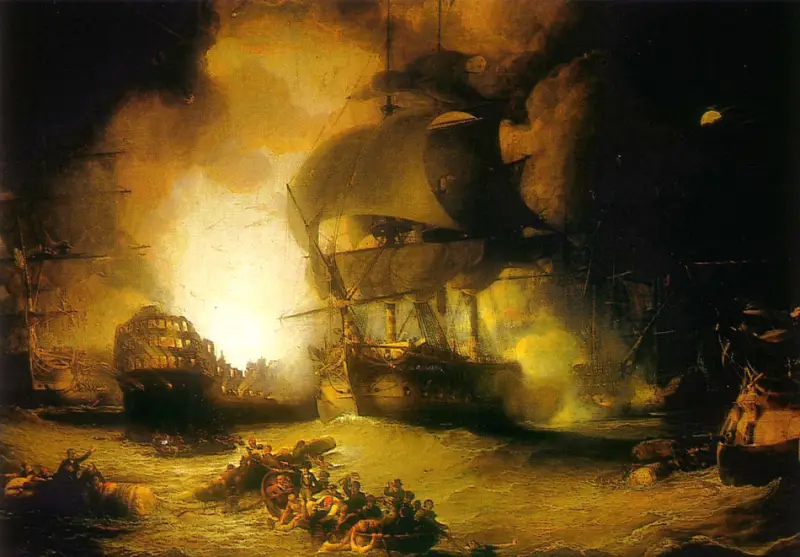
J. Arnold "Naval Battle of Aboukir (Battle of the Nile) August 1, 1798"
В previous article we talked about how Napoleon Bonaparte and Horatio Nelson were heading towards a clash at Aboukir. About the preparation of a large-scale Egyptian campaign, its beginning, the unexpected capture by the French of the island of Malta, which belonged to the Hospitallers, and the far-reaching consequences of this capture. About the failure of Nelson, who was unable to prevent the movement of the French fleet and the landing of Bonaparte's army in Alexandria. The first article ended with a story about how Nelson managed to discover the French fleet in Aboukir Bay, and now he was going to take revenge, telling his captains that he would either become a lord or be buried in Westminster Abbey. This article will focus on the naval battle of Aboukir, often referred to in Britain as the Battle of the Nile.
Before the battle
So, after a long search, Nelson finally discovered French ships anchored in Abukir Bay on August 1, 1798. At the time of the appearance of Nelson's squadron, the captains of the French ships were at a meeting, which Bruet was holding on board the flagship battleship L'Orient. About three thousand sailors were sent ashore for fresh water from Rosetta, and barrels pulled from the holds cluttered the battery decks. Meanwhile, the distance from the coast to the first line battleships was 4 miles.
The sun was setting, and few believed that the British would dare to start a battle at such an inconvenient time. Nevertheless, an order came to return to the ships, but it was too late. Noting that the northwest wind was favorable for his squadron, Nelson gave the signal to attack at about 18:30.
At this time, some French captains were in boats sailing towards the ships, and many sailors were still on shore. And therefore, it was decided to transfer part of the crews of the four frigates stationed in the second line to battleships: this weakened the ships’ data, and the battleships had to fight with sailors from other teams on board, which sharply reduced their combat effectiveness.
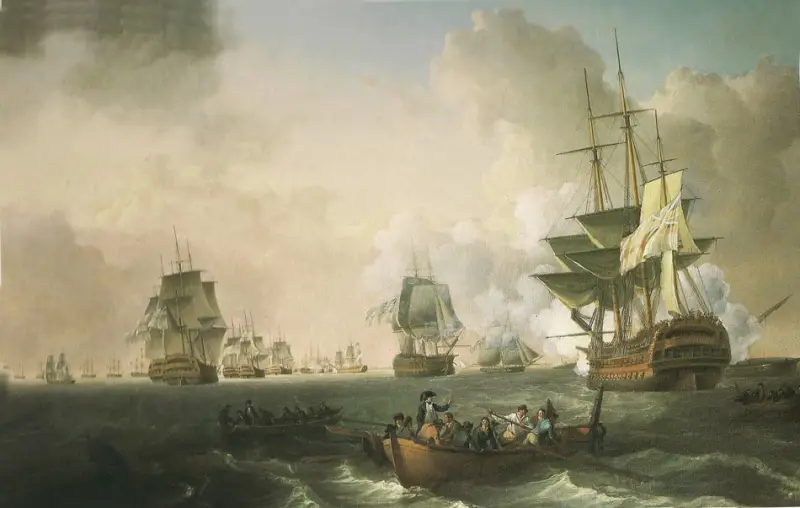
W. Anderson "Battle of the Nile August 1, 1798"
Due to the lack of sailors, only the right sides of the French ships were prepared for battle, while the decks of the left ones, facing the shore, were filled with barrels and other belongings, which made access to the guns difficult.
In addition, the French ships were lined up very poorly. There were 13 ships of the line in the first line (one 120-gun, three 80-gun, nine 74-gun), but they were too far from the shoals to give the British a chance to outflank them.
In addition, the ships of the first line were too far from each other and were not connected to each other by ropes. Four frigates were placed in the second line. And about 30 transport ships, as well as 4 brigs, were located in front of the shore at Cape Abukir. The rearguard was commanded by Pierre-Charles de Villeneuve.
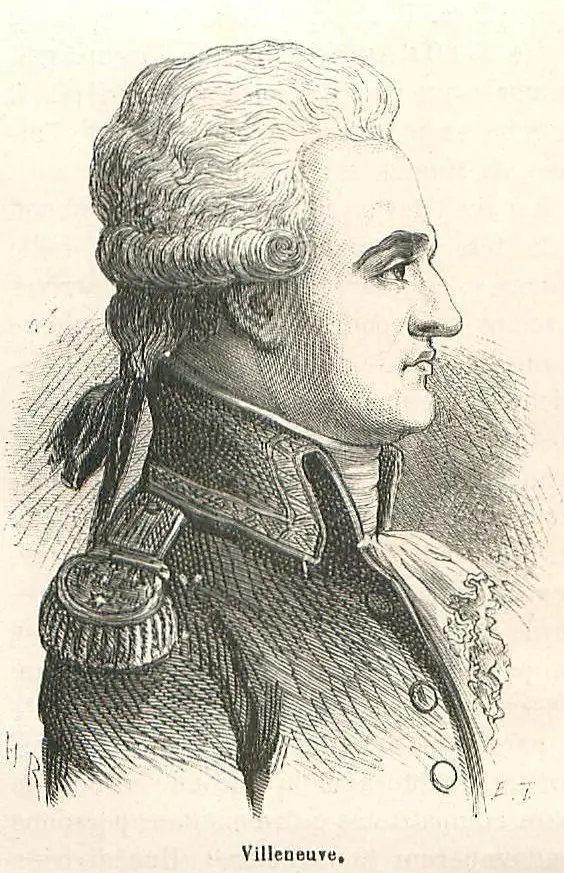
Pierre-Charles Villeneuve
The artillery battery (6 guns) placed on the small island of Abukir was too weak.
The Battle of Abukira
It must be said that the forces of the parties then turned out to be almost equal. Nelson had 14 battleships to the French 13, but Bruhe also had 4 frigates and an artillery battery on Aboukir Island. The ships of the English squadron carried 1 guns and 012 thousand sailors, the French ships carried 8 guns and 1 thousand sailors. The French fought bravely and with great dignity, but their heroism could not compensate for the mistakes made by Admiral Bruet.
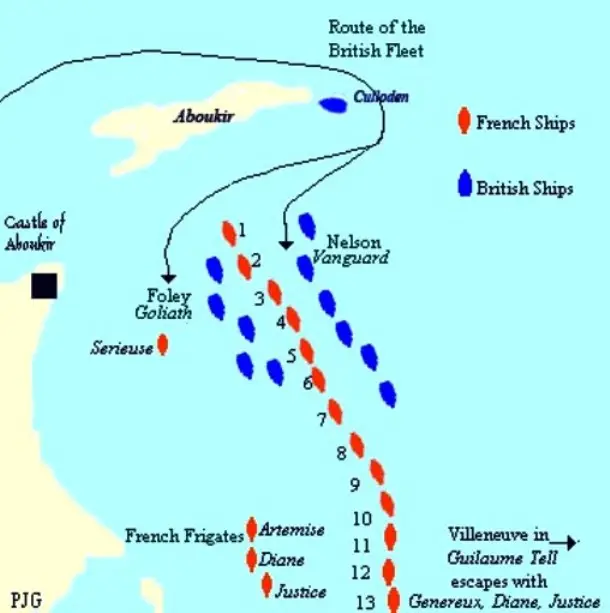
Scheme of the Battle of Abukir
The line of English battleships was led by the Goliath, whose captain, Thomas Foley, noticed that the French ships were too far from the shore. At the risk of running his ship aground, he decided to outflank them (note that one of the English ships, the Culloden, actually ran aground, receiving serious damage to the hull, and did not take part in the battle).
But the Goliath bypassed the French battleship Guerrier and attacked it, while the decks of the French ship were also fired upon by English marines and Austrian grenadiers with muskets. Having passed by the "Guerrier", the "Goliath" found itself in front of the battleship "Conqurant" (Conqurant - "Conqueror"), the French, as you remember, practically could not respond to it, since the guns on their left sides were not prepared for battle.
Foley's success did not go unnoticed by other captains, and his ship was followed by the Ziles, commanded by Samuel Hood.
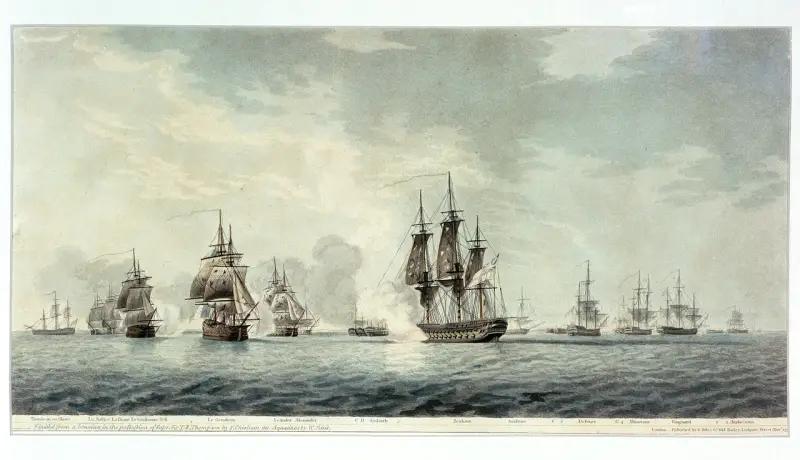
Zealous in the foreground in a painting by W. Ellis
This ship began to finish off the Guerrier, which lost its mast and received significant damage. The frigate Serieuse opened fire on the English ship "Orion" (captain - James Sumarez), which was following the "Ziles" - this was a rather rash decision, since, according to the convention on naval warfare, battleships were not supposed to engage in battle with frigates , if the enemy had ships of the same class as them. But, since the French themselves violated this rule, the Orion fired a salvo, after which the enemy frigate was forced to flee to shallow water.
Next, the British ships Theseus and Odeyshes (Audacious – “Daring”), which bypassed the French formation, successfully entered the battle. And the battleships "Vanguard" (Nelson's flagship), "Minotaur" and "Defence" attacked the French from the sea - their opponents were "Spartiat", "Aquilon" and "Soverien".
And Bellerophon and Majestic attacked the center of the French line. The first of them found itself in front of the French 124-gun flagship L'Orient: having lost its mast and suffering 200 casualties, this English ship withdrew from the battle. But the French admiral Bruet was also wounded. The Majestic also suffered significant damage when it collided with the battleship Tonnant, which outnumbered it in the number of guns. Its captain, George Westcott, was killed.
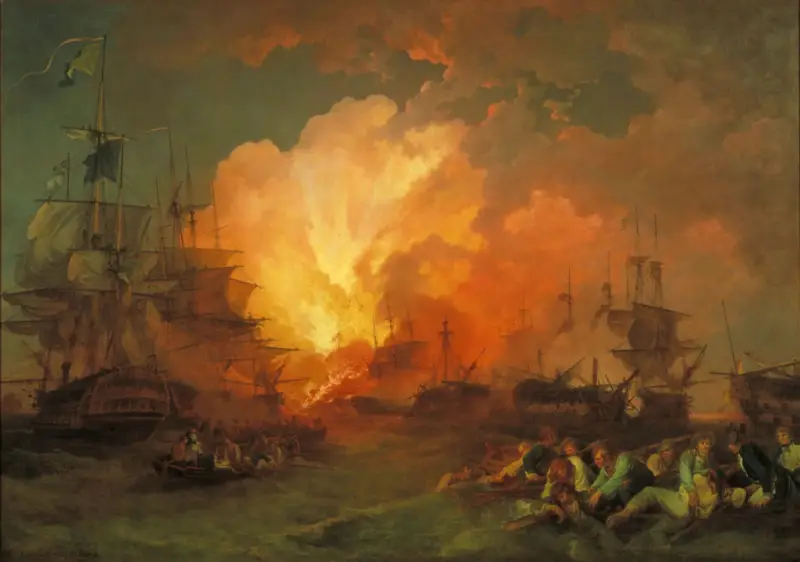
Jacques Philippe de Loteburg the Younger "Battle of the Nile August 1, 1798"
The first of the French ships to surrender, at about 20:00, was the Conqueran, which had lost all three masts. The second, about an hour later, was Guerrier. Then the Spartyat, which was fighting three enemy ships, was forced to capitulate, but before that, its gunners with a successful shot inflicted heavy losses on the Avangard sailors - about 100 people were killed and wounded.
A piece of shrapnel hit Nelson's forehead, and a flap of skin covered his good eye. Seeing nothing in front of him, Nelson decided that he was dying and shouted: “I am killed.” However, the ship's surgeon quickly applied a bandage, and the English admiral was able to return to the deck.
The Sovereign, attacked from two sides by the battleships Orion and Defense, having received serious damage, left the battle - like Orion.
Meanwhile, L'Orient, which, as we know, was able to drive away the English ship Bellerophon, was attacked by a larger ship. It was the Swiftsure, whose gunners fired very well. At about 9 o'clock in the evening, the French flagship was engulfed in fire, the captain of this ship, Luc-Julien Casabianca, was seriously wounded, and both of Bruet's legs were torn off by a cannonball. The French admiral ordered himself to be tied to a chair on the deck, but another cannonball hit him in the stomach, almost cutting him in two. At about 10 o'clock in the evening, the Orient's powder magazine exploded - the sounds of this explosion were heard even in the city of Rosetta, which was located 32 km from the battle site.
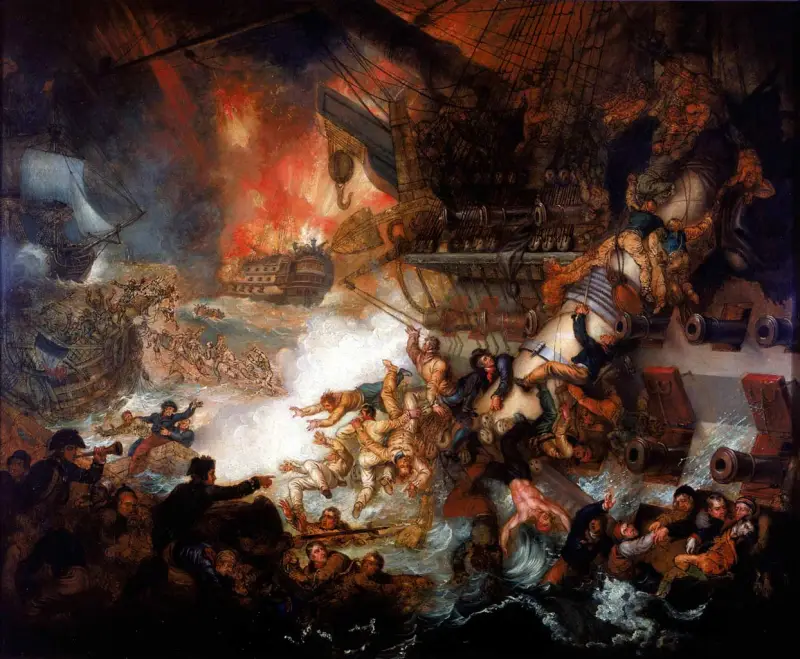
Explosion of the battleship L'Orient in a painting by T. Brown
A large piece of the Orient's mast fell onto the deck of the battleship Swiftsure. A coffin was then made from it, which was solemnly presented to Nelson. The admiral gratefully accepted this gift and always took it on his ship. In this coffin he was buried after his death in the Battle of Trafalgar, but not in Westminster Abbey, as he dreamed, but in St. Paul's Cathedral.
Together with the Orient, 600 thousand pounds sterling in gold bars and precious stones, requisitioned from Switzerland and the Vatican, and almost all the treasures of the Johannite Order captured in Malta went to the bottom.
Almost immediately he was forced to surrender, surrounded by three English ships, the Franklin.
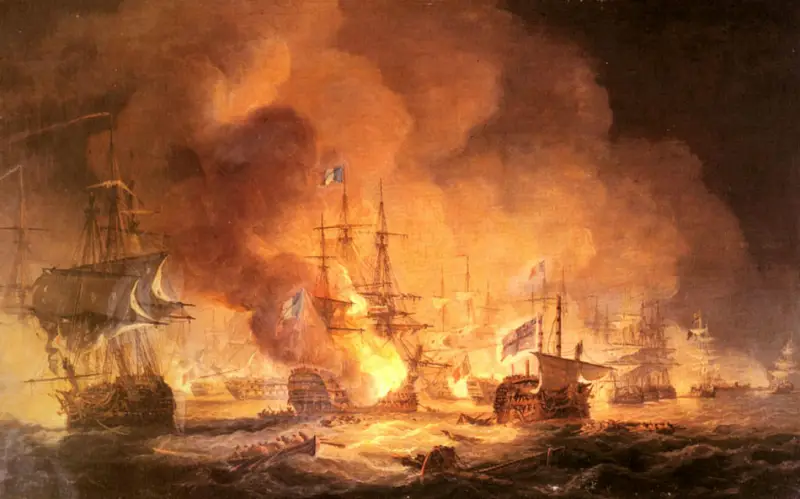
T. Looney. Battle of the Nile August 1, 1798 at 10 p.m.
"Tonnan" held out until midnight, its captain Aristide Aubert Petit-Thouars, having lost both legs and an arm, so that the flags would not fall, ordered them to be nailed to the mast. Feeling the approach of death, he demanded to “blow up this damn chest, but not give up.”
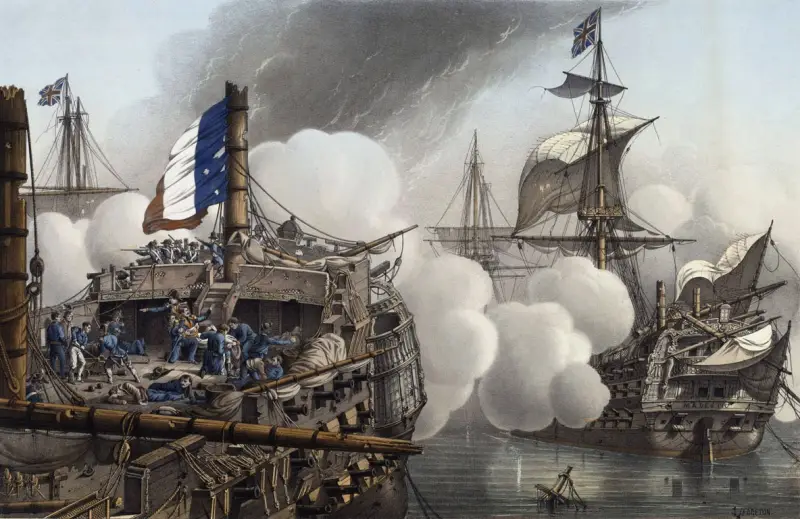
Louis Breton "Tonnant during the Battle of the Nile"
The British captured this ship only on August 3.
The battleship Timoleon and the frigate Artemiz were sunk by their crews. The frigate Serieuse sank due to critical damage received in the battle. "Guerrier", "Hercules" and "Mercury" were captured by the British, but with such damage that the victors chose to scuttle them. But the battleships “Spartiat”, “Konkeran”, “Aquilon”, “Franklin”, “Soverien”, “Tonnan” were repaired and introduced into the English fleet. At the same time, “Aquilon” received the name “Abukir”, and “Franklin” - “Canopus” (this is the former name of the city of Abukir).
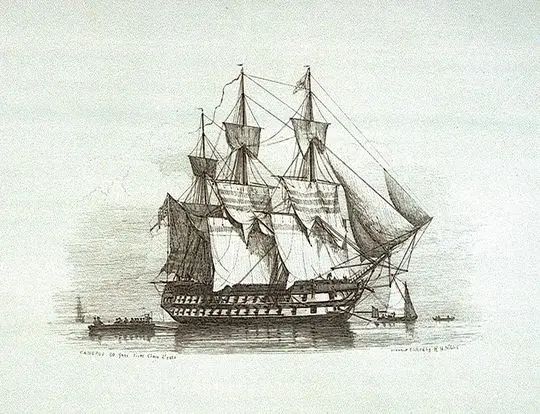
No longer “Franklin”, but “Canopus” in a watercolor by Richard Henry Knibbs
The battleships “Guillaume Tell”, “Zhenerier”, frigates “Justice” and “Dayan” were taken away from Abukir by the commander of the rearguard, Pierre-Charles de Villeneuve. In 1805, this admiral would once again enter into battle with Nelson at the Battle of Trafalgar, be captured, and then commit suicide.
And now the ships of Villeneuve’s small squadron tried to pursue the English battleship Ziles, but quickly fell behind. And only then did English frigates begin to arrive at Alexandria: first, on August 11, the Alkmena, the next day, the Bonn Situayen and Emerdald. Finally, on August 17, “Seahorse” and “Terpsichore” returned, which, as we remember from first article, discovered the French fleet on July 21, but did not find Nelson - and were unable to inform him of their “discovery.”
Later explaining the long search of the French, Nelson often quoted the English proverb “The children of the devil always have the devil’s luck.” However, in private conversations he sometimes complained about the too great desire of the commanders of these four frigates to “catch prizes” (which was financially profitable) instead of fulfilling the task assigned to them.
The British had only two ships seriously damaged - Bellerophon and Majestic.
What were the human losses on both sides?
The French, according to various sources, lost from 2 to 000 people, the British killed 5 people, 000 were wounded.
After the battle
The next day, when the sun rose, the British saw battered French ships and “a whole bay covered with corpses, parts of human bodies, wounded and burned, with practically no clothes on.”
Nelson said:
A solemn prayer service was served on the English ships, which the French prisoners were also supposed to attend.
The news of the victory at Abukir arrived in London on October 2 - and rejoicing spread throughout England. King George III granted Nelson the peerage of Neale and Burnham Thorpe and an annual "pension" of three thousand pounds sterling to be received by two generations of his male heirs. The East India Company presented Nelson with 10 thousand pounds.

Monument to Nelson in Portsmouth
In addition, Nelson became the first Knight of the Ottoman Order of the Crescent.
A pleasant reward awaited the admiral in Naples: Emma Hamilton, the wife of the English envoy to the court of King Ferdinand IV of the Two Sicilies and a close friend of the local royal couple, began to personally look after the wounded hero. Emma Hart, an orphan from a very poor family and a former child prostitute, who became pregnant at the age of 16 and gave birth at 17, was unexpectedly lucky: the young aristocrat Charles Greville decided to play with her Professor Higgins from Bernard Shaw's play written in 1912. Pygmalion". His lessons lasted three years, and Emma turned out to be a very talented and diligent student.
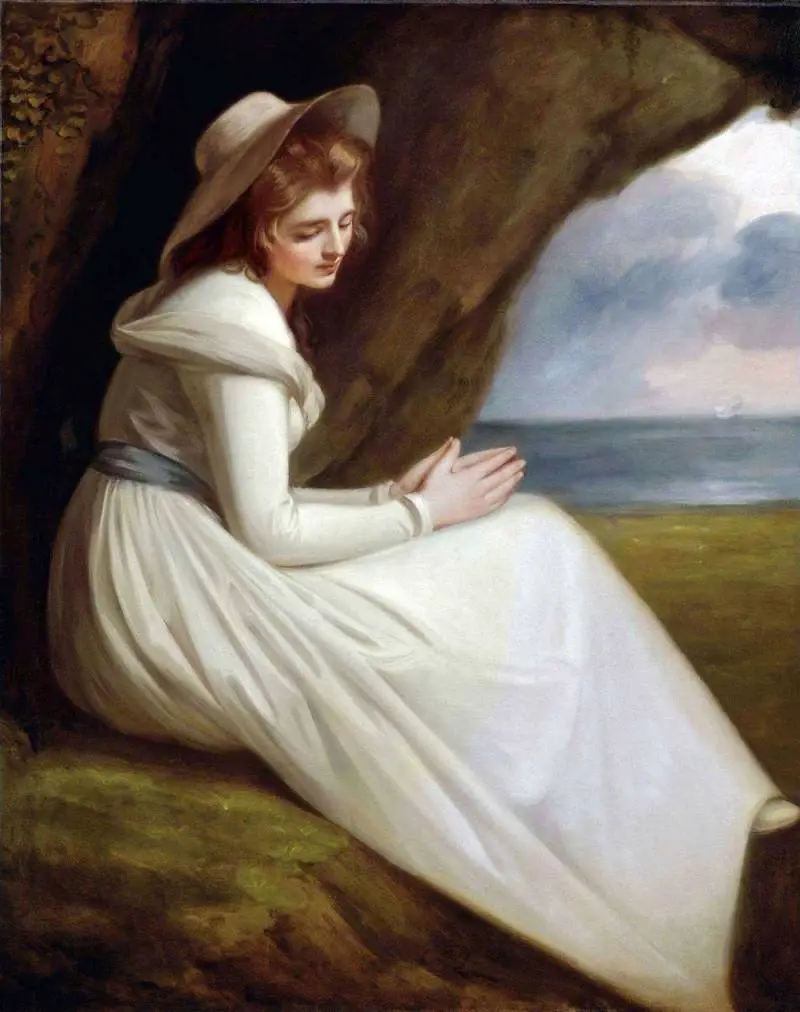
George Romney. Emma Hart as Ariadne, 1785
Then, at the request of his father, Charles married a “worthy” girl from a “good family”, and handed over his kept wife to a relative, Lord William Hamilton.
Nelson and Emma had known each other since 1793, when the Englishman first arrived in Naples to negotiate the provision of soldiers to defend Toulon, which was besieged by the army of the French Republic.
But it was now, after the victory at Abukir, that a famous romance broke out between Nelson and Emma, which became the plot of many novels, plays and films. Sir Hamilton preferred to pretend that the English admiral was just a family friend. Not all Englishmen liked Nelson’s behavior in Naples, and D. Moore wrote about him to the English Admiralty:
When Naples was captured by French troops, it was Nelson who led the evacuation of the local royal family to Palermo.
The defeat of the French fleet at Abukir led to the formation of a new - Second, anti-French coalition, which included England, Austria, the Holy Roman Empire, Portugal, the Kingdom of Naples, Russia and the Ottoman Empire - and Fyodor Ushakov unexpectedly found himself an ally of the Turks. He liberated the Ionian Islands and Naples captured by the French, met in Palermo with Nelson, who invited him to take part in the siege of Malta (but Paul I had already ordered the Russian squadron to be withdrawn to the Black Sea).
They say that the English admiral proudly showed Ushakov that famous coffin, made from a piece of the mast of the French flagship L'Orient. And Suvorov then defeated the French armies of MacDonald and Moreau in Italy. After this, the “grateful” Austrians sent his army to Switzerland - into a trap prepared by Massena, and Suvorov was forced to make a difficult transition through the Alps.
Let's return to Egypt - back in August 1798.
Napoleon received news of the defeat of the French fleet only 2 weeks after the battle of Aboukir. This disaster actually buried all his plans, and the Egyptian campaign, which had begun so brilliantly, turned into a miserable adventure that did not have the slightest chance of success. Bonaparte's army was now in a large African cage - it was cut off from France without the possibility of receiving reinforcements and did not even have contact with the Directory.
The war in Egypt and Syria continued for another three years, several striking victories were won, but these were tactical successes against the backdrop of strategic defeat. It all ended with Napoleon's actual flight from his army - on August 22, 1799, he left Egypt.
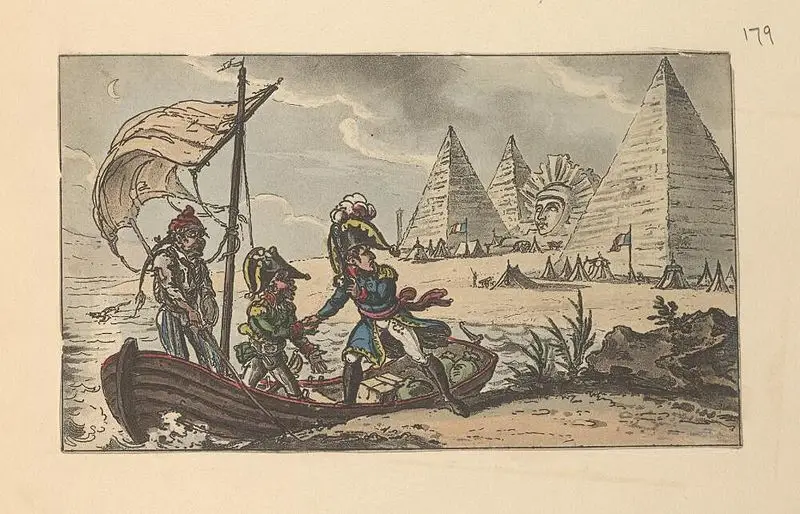
Napoleon's flight from Egypt in a caricature by J. Krushanka
On October 9, Bonaparte's lucky star brought the frigates La Corriere and Murion to the port of Frejus.
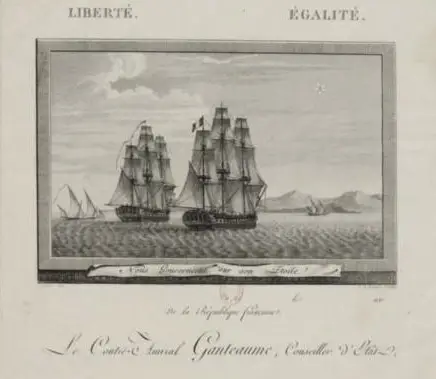
Yves Marie Le Gouaz. Navires Le Carere and Le Muiron
Together with Bonaparte, his closest friends and collaborators returned to France - Berthier, Murat, Junot, Lannes, Duroc, Bessieres, Marmont, stepson Eugene Beauharnais, as well as the chemist Claude Louis Berthollet, the future minister of naval mathematician Gaspard Monge, the future head of the French postal department Antoine Marie Lavalette.
A month later - on November 9, 1799 (18 Brumaire of the VIII year of the Republic) Napoleon carried out a coup d'etat, dispersing the Council of Five Hundred and the Council of Elders.
Other famous French military leaders who took part in the Egyptian campaign were less fortunate. The ships "Etoile" and "Santa Maria della Grazia", on which Davout and Deze were, were intercepted by the British in February 1800. True, a month later they managed to come to an agreement with the British, and the prisoners were able to return to their homeland.
But the remaining commander-in-chief, Jean-Baptiste Kleber, who was called the “Nestor of the French army,” was killed on June 14, 1800 by the Syrian Kurd Suleiman al-Halabi. His successor, General Jacques-François Menou, on August 31, 1801, was forced to sign a convention with the British on the abandonment of Alexandria and the return of French troops to France.
Information